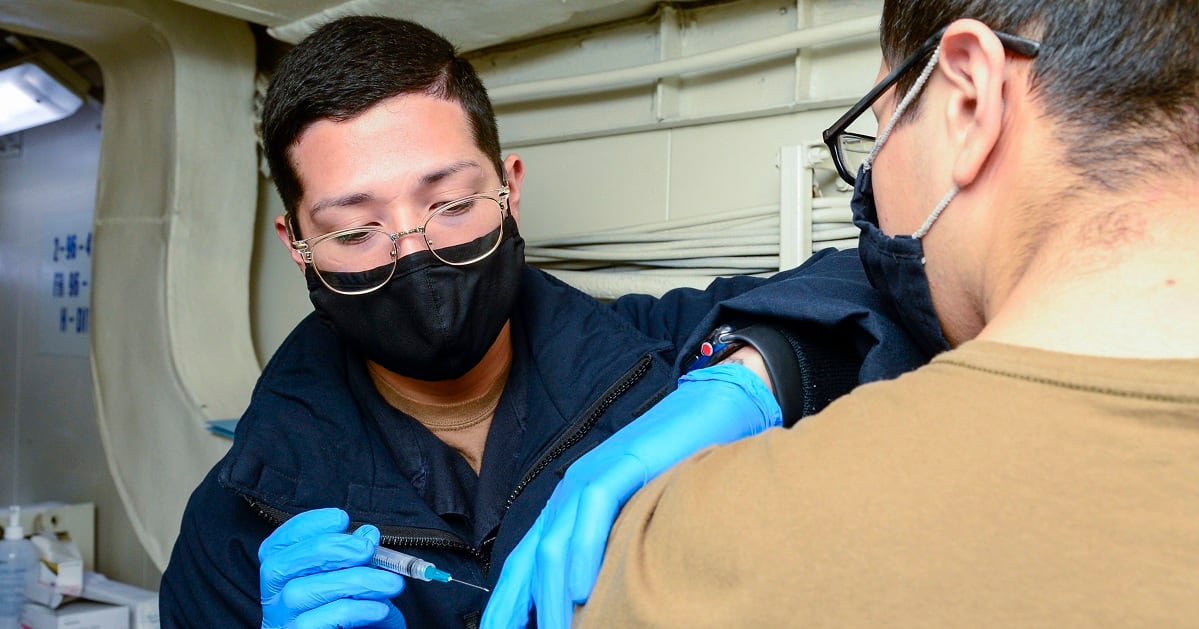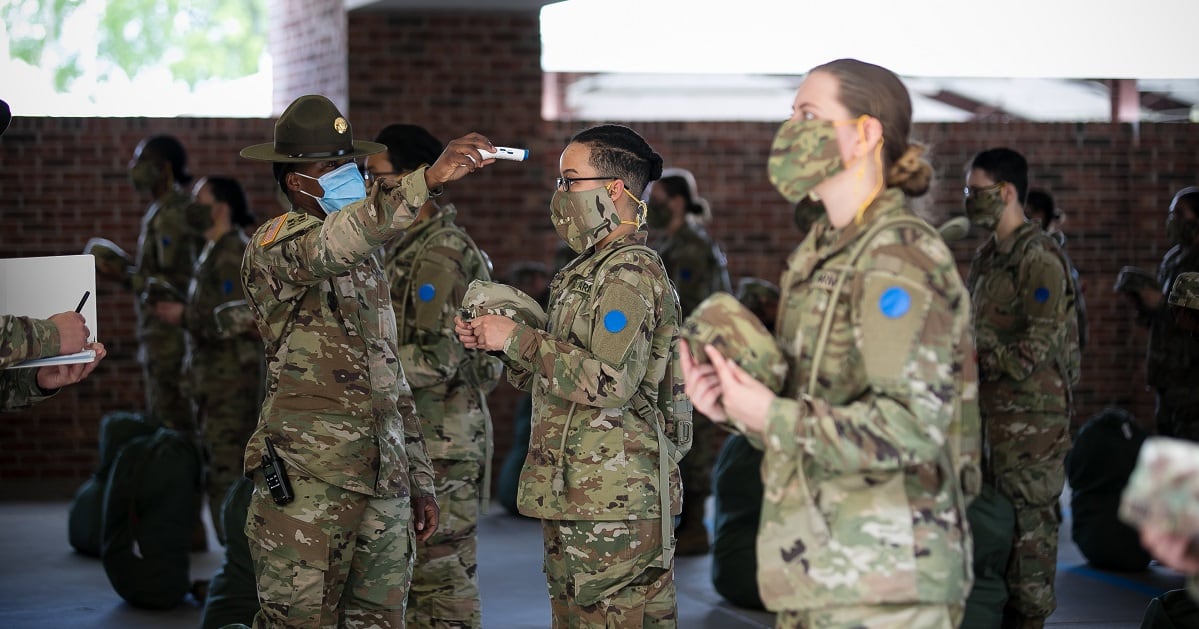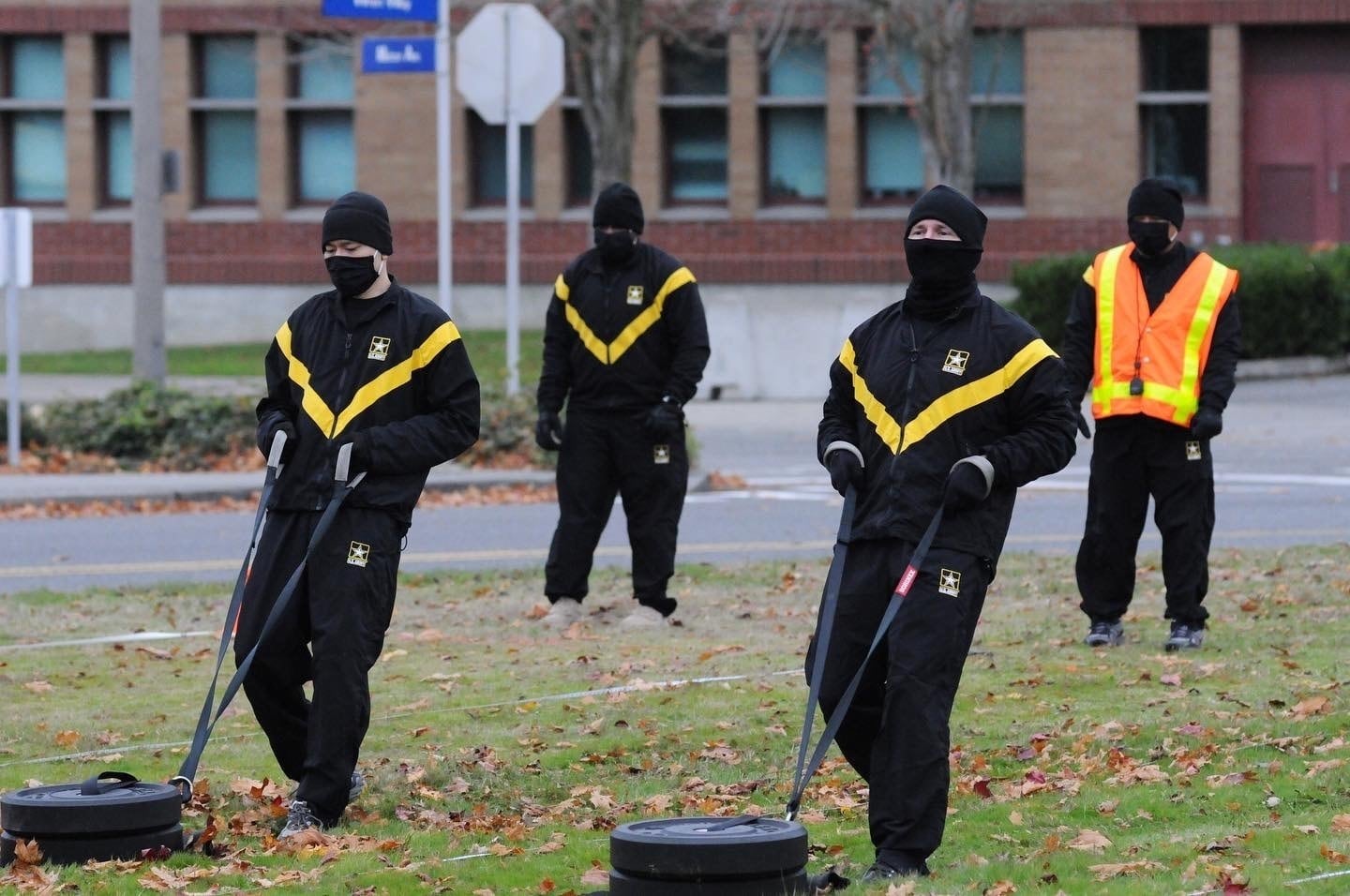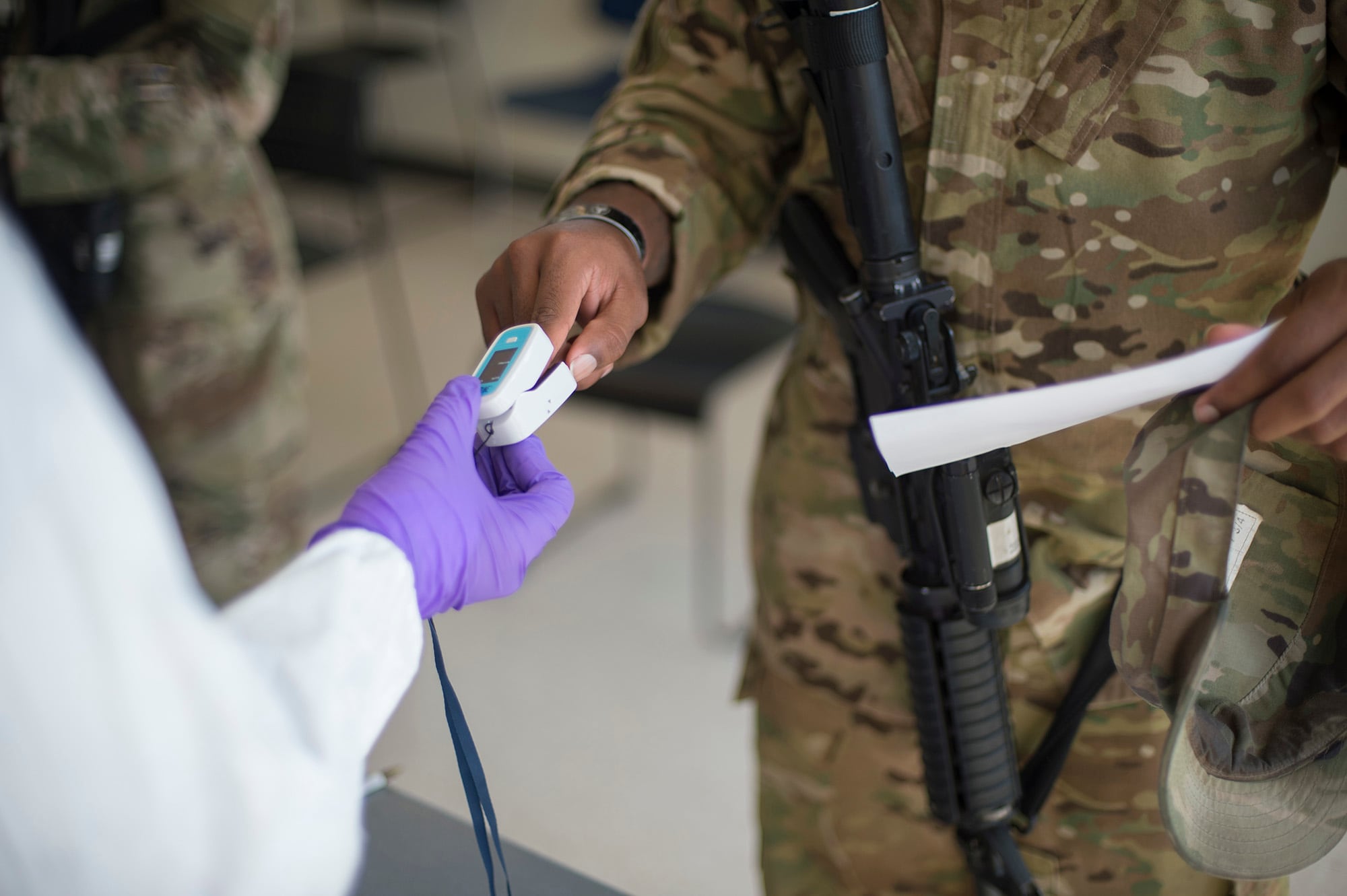“I had a slight headache.”
That’s how the senior field artillery NCO’s bout with COVID-19 began during his deployment to the Middle East last year. Soon he was in the intensive care unit at a U.S. military hospital, where he would stay for about a month.
“On about day seven, that’s when everything took a turn for the worse,” said the NCO, who requested anonymity to speak freely about his experience to Army Times. “I sat in the shower for about three hours — about 2:00 a.m. until 5:00 a.m., a low point in my life — vomiting all over myself, urinating on myself, defecating on myself.”
Things haven’t gotten much better since.
He’s one of the so-called “COVID long-haulers” who is still experiencing life altering symptoms of the disease nearly a year later. He says his enduring shortness of breath, brain fog, fatigue, dizziness and short term memory loss keep him from being able to do his job as a soldier.
“I’m currently working about two, three hours a day and will max out at about 10 hours a week,” he said. “I don’t believe I am an asset to my organization…I cannot get on a plane and deploy after a year [of recovery]. That should be a no-brainer that I am separated…I don’t see the benefit of maintaining myself as an active-duty soldier.”
Army Times spoke with the senior NCO and two additional soldiers experiencing enduring COVID-19 symptoms of varying severity, in addition to asking Army and Veterans Affairs officials about medical support for long-haulers.
Simply put: death isn’t the only COVID-19 outcome that can take a soldier out of the fight for good.
RELATED

If a soldier “believes they have a chronic condition attributed to an in-service event, injury or diagnosis (to include COVID-19), they are highly encouraged to file a claim [for disability benefits,” VA spokesperson Gina Jackson told Army Times.
Jackson also pointed to a law signed earlier this year that directed the VA to presume that COVID-19 diagnoses are service-connected for all active-duty troops or reserve component personnel serving on federal active duty.
According to the CDC’s website, an unknown number of people who survive the disease experience “post-COVID conditions,” which it describes as “a wide range of new, returning, or ongoing health problems people can experience four or more weeks after being first infected with the virus.”
The Long COVID Alliance, a collective working to inform policymakers about the disease and accelerate research into the condition, estimates that 3.2 million Americans are experiencing at least one post-infection symptom.
Scientists aren’t sure how common long COVID is, or many people experience physically-disabling symptoms like that of the field artillery NCO. One expert told the Wall Street Journal in June that as many as 5 percent of people could have long-term issues with the disease.
Many symptoms of long COVID can affect a soldier’s ability to perform their job. According to the CDC, the symptoms can include:
- Difficulty breathing
- Tiredness or fatigue
- Symptoms that get worse after physical or mental activities
- Difficulty thinking or concentrating (“brain fog”)
- Cough
- Chest or stomach pain
- Headache
- Fast-beating or pounding heart (also known as heart palpitations)
- Sleep problems
- Dizziness on standing (lightheadedness)
- Mood changes
- Change in smell or taste
Despite the potential impact, the Army doesn’t know how many soldiers are suffering with long COVID, service spokesperson Lt. Col. Gabriel Ramirez told Army Times.
“Currently the number of Soldiers receiving treatment for long-haul COVID is not tracked by the Army,” Ramirez said. “The Army provides the same accommodations and treatment for all Soldiers with medical issues.”
But some soldiers who still have residual symptoms are worried they won’t be able to continue serving or get the medical care they need.
The field artillery NCO will leave the Army next year, he said, though he was already eligible for retirement when he became sick.
“Military doctors don’t take me seriously,” a second soldier told Army Times. He says he contracted the disease while in training early last year, but there wasn’t testing available at the time.

“I had severe flu-like symptoms, plus the signature [ones like] no taste, no smell, cough, fever [and] congestion,” despite only being in his late twenties, he said. Today, more than a year-and-a-half after he got sick, he is still experiencing heart palpitations and extreme shortness of breath during exercise.
The second soldier says that medical professionals don’t take him seriously because he never had a positive COVID-19 test — or any test for that matter. He’s worried he’s going to fall through the cracks as a result and lose his Army career, which he described as a second chance in life.
“I was planning to do the full 20 [years to earn a retirement], but I am very concerned about whether I will be able to stay in if doctors don’t start taking me seriously,” he said.
Army doctors, he added, have not yet ordered him to get a chest CT scan, which medical researchers have used to identify lasting lung damage in a significant subset of COVID survivors and long COVID patients.
“I don’t know what else to do because I am genuinely terrified that something is happening to my heart and body, and we can’t seem to figure it out,” the soldier said. “I keep getting told I’m fine but I can physically feel something is not right with my body…I considered finding a doctor off-posts but the costs are very expensive and I can’t afford it.”
While his job isn’t physically demanding, he said, he can no longer run two miles fast enough to pass the new Army Combat Fitness Test. The ACFT has a much slower passing run time — 21 minutes — than the old PT test.
The Army has processes to ensure soldiers medically unable to do their jobs aren’t immediately forced out of the military empty-handed, though.
There are MOS Administrative Retention Review boards, or MAR2, to see if soldiers can cut it in another role. And then there’s the Integrated Disability Evaluation System to determine VA disability for troops who medically can’t stay in the service, Army spokesperson Ramirez explained.
To date, “no Soldiers have been moved into process to remove based on COVID-19 conditions,” Ramirez said.

The medical separation process can only begin when a soldier has reached a “medical retention determination point” where an Army doctor has determined that a soldier’s medical condition is roughly stable and the service member likely isn’t capable of performing their duties anymore, Ramirez added.
This usually doesn’t happen until 12 months after injury or illness, according to Ramirez.
The senior field artillery NCO has an approved retirement date and was already going to receive 100 percent VA disability, so he said he’s not worried about going through the MAR2 and IDES process.
The second soldier — who can do his job but will soon no longer meet physical fitness standards when the Army’s moratorium on old PT test scores expires — the MAR2 and IDES process may not be what happens.
He’s more likely to be involuntarily separated for fitness issues before the end of his current contract, which could result in a less-than-honorable discharge and cost him his GI Bill benefits.
A third soldier reached by Army Times falls into another category — troops with enduring COVID symptoms who can meet standards for continued service.
The soldier, who is in his mid-twenties, was in basic training last fall when he got sick, he explained, but he and the other trainees didn’t report their illness or get tested.
“The company I was assigned to had just come off quarantine as a few members had had COVID,” he said. “None of us were going to delay our time in [training] by getting tested and [getting] the entire company quarantined [again].”
He had a mild bout of the disease, he added, with loss of taste and smell and light shortness of breath being his primary symptoms — they were easy to conceal, and he admitted he “was very selective about who [he] told.”

“After we graduated, a bunch of us met up and admitted that we had all gotten symptoms [of COVID] around the same time, but there was no way we were going to stay in [basic training] any longer than we had to,” he said.
His sense of smell hasn’t returned in the year since then. It “usually” doesn’t affect his job, he said.
“I can’t smell diesel fumes or smoke. In a job like the military that can actually be a danger,” he said before noting one unexpected bonus — “I don’t have to smell the barracks.”
His chain of command has supported him seeking medical attention for the enduring symptom, but he’s not optimistic it will help.
“I’m not very hopeful there’s much they can do based off the experiences I’ve heard,” he said. Medical researchers are still trying to find ways to combat long COVID and other similar post-viral syndromes.
He may face an uphill battle trying to secure VA care when he someday leaves the Army since he never took a COVID test. Loss of smell is a recognized compensable disability for the VA even independent of other conditions — if he can prove the service connection without a test result.
“I just want to smell again,” he said. “I used to love smelling my morning coffee, cooking, my home — I’m definitely missing a really basic part of how I used to experience life.”
Davis Winkie covers the Army for Military Times. He studied history at Vanderbilt and UNC-Chapel Hill, and served five years in the Army Guard. His investigations earned the Society of Professional Journalists' 2023 Sunshine Award and consecutive Military Reporters and Editors honors, among others. Davis was also a 2022 Livingston Awards finalist.





